Brother Reaches His Limit With His Freeloading Sister After She Adopted a Dog She Can't Care For Because She Has No Income
You can only exploit another person's good intentions for so long before they realize you're taking advantage of their kindness. Even the kindest people have their limits.
An entitled 21-year-old is about to find out what happens when a kind person is pushed to the brink. The patient OP opened his and his girlfriend's home to his younger sister while she was job hunting.
His younger sister can't seem to last in any apartment she rents. Living with her for seven months opened OP's eyes.
He knew his sister was spoiled growing up. She is their only sister and was treated like the golden child for most of their lives.
No one likes an entitled grown-up, and OP's sister exhausted any goodwill she had with their relatives. OP and his girlfriend were the only people willing to extend any help to her.
It didn't take long for OP to realize that opening his home to his sister was a big mistake. She is a terrible roommate.
She doesn't clean up after herself, stays up late, eats most of their food, and has no regard for other people's time.
Within the first month, OP and his girlfriend sat down with his sister to give her options. She could either help around the house or pay her share of their household bills, which skyrocketed since she moved in.
She refused and said she was a guest in their home who shouldn't have to contribute anything.

She doesn't shy away from playing the family card and makes it seem like she is doing OP a favor by staying with them.
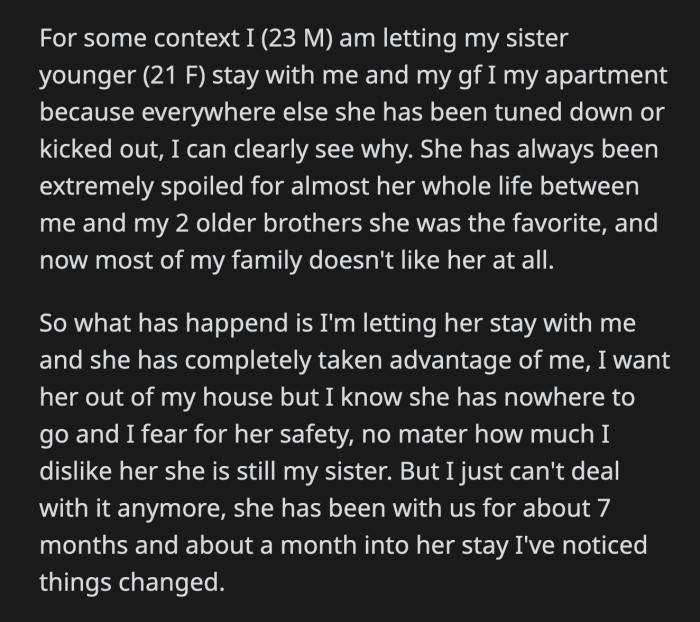
OP constantly reminds her of the options they gave her, but she acts like she can't hear him.
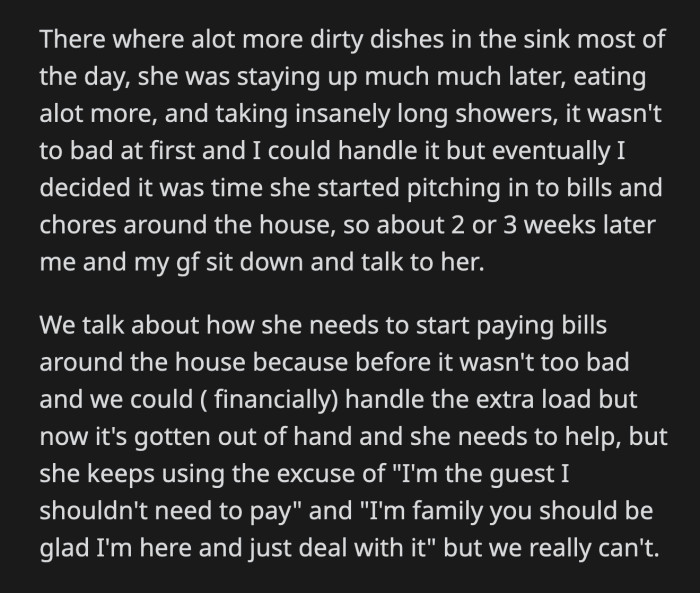
Family Dynamics and Responsibility
The relationship between siblings can often be complicated, especially when one sibling relies heavily on another for support. Research indicates that patterns of co-dependency can develop when familial obligations become imbalanced. According to studies published in the Journal of Family Issues, these dynamics can create feelings of resentment and burnout in the more responsible sibling.
In this case, the brother's frustration likely stems from the perception that his sister's choices are irresponsible and significantly impact his life.
The final straw was when she adopted a dog without consulting the homeowners. She even expects OP or his girlfriend to pay for the dog's vet bills and living expenses. OP finally told his sister to start contributing or he would kick her out.
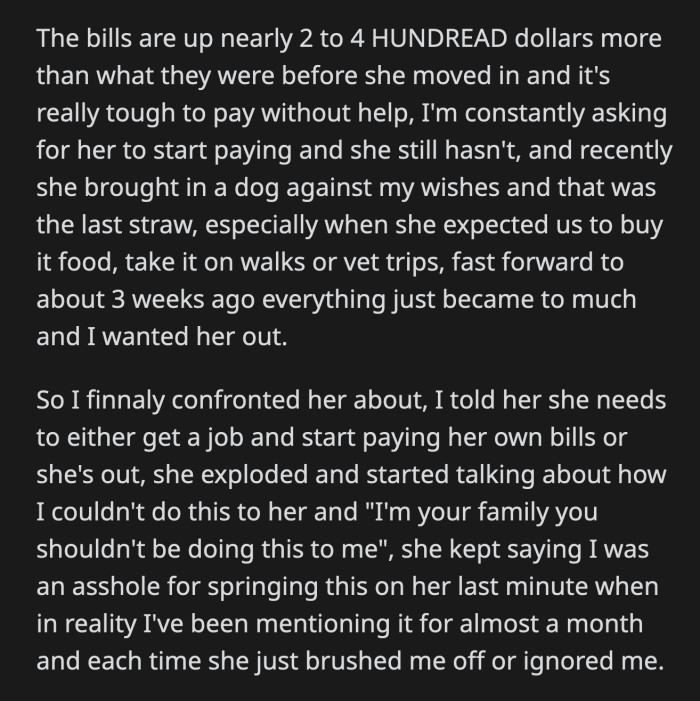
He is done dealing with her, especially after she started to boss his girlfriend around and steal her belongings. Would it be out of line for OP to kick his sister out of their house?
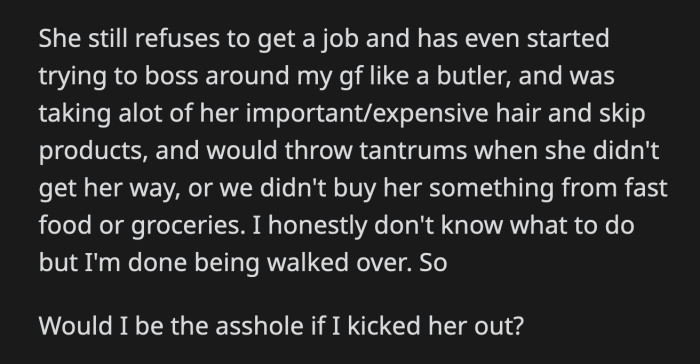
Everything his sister has done so far is enough to warrant kicking her out. What other disaster is OP waiting for?
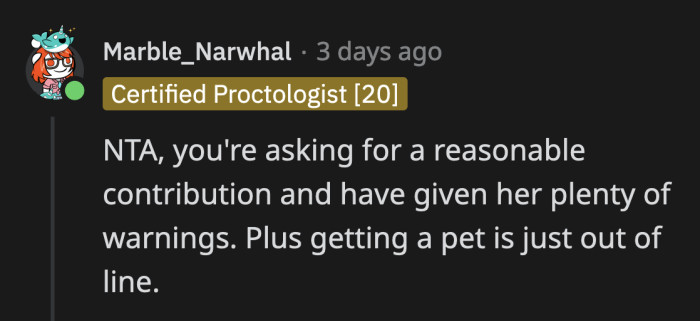
Addressing co-dependency requires open communication and establishing healthy boundaries. Family therapists often recommend engaging in honest conversations about responsibilities and needs. Research shows that when family members articulate their feelings and expectations clearly, it leads to improved relationships and reduced conflict.
Setting firm boundaries regarding financial or emotional support can help siblings navigate their responsibilities while preserving their own well-being.
If OP continues to enable his sister, he will lose his home, his girlfriend, or both.
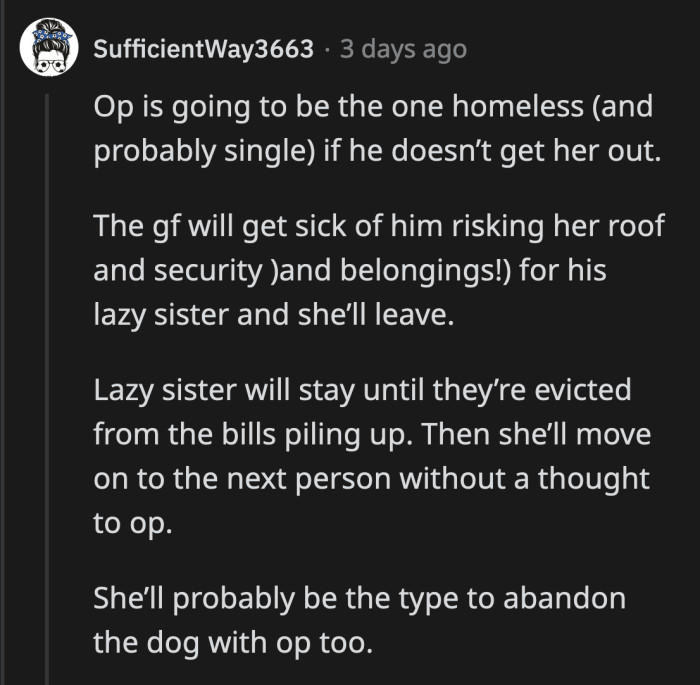
It's long overdue for his sister to start learning about responsibility. It won't happen if OP allows her to mooch off them indefinitely.
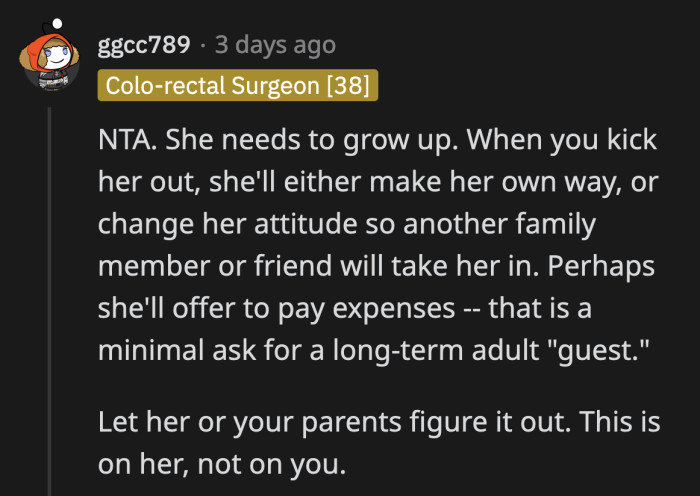
She has no incentive to change because she has always gotten what she wanted by throwing her weight around.
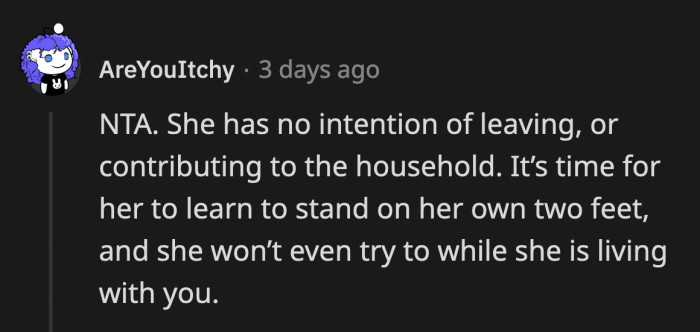
Understanding Financial Independence in Adulthood
Financial independence is a crucial aspect of adult development, often tied to self-esteem and life satisfaction. Studies in the Journal of Economic Psychology indicate that young adults who manage their finances successfully report greater confidence and autonomy. In this situation, the sister's inability to support herself financially may hinder her personal growth and exacerbate her dependency on her brother.
Encouraging her to seek employment and establish a budget can foster her independence and alleviate some of the pressure on her brother.
She had seven months to find a job and save enough money to get her own place, but she spent it taking advantage of her brother's kindness.
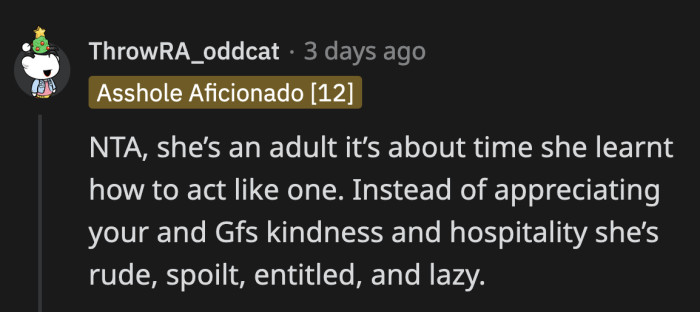
OP shouldn't let his sister ruin his life the way she did hers.

If it were any other roommate, OP would have kicked them out a long time ago.
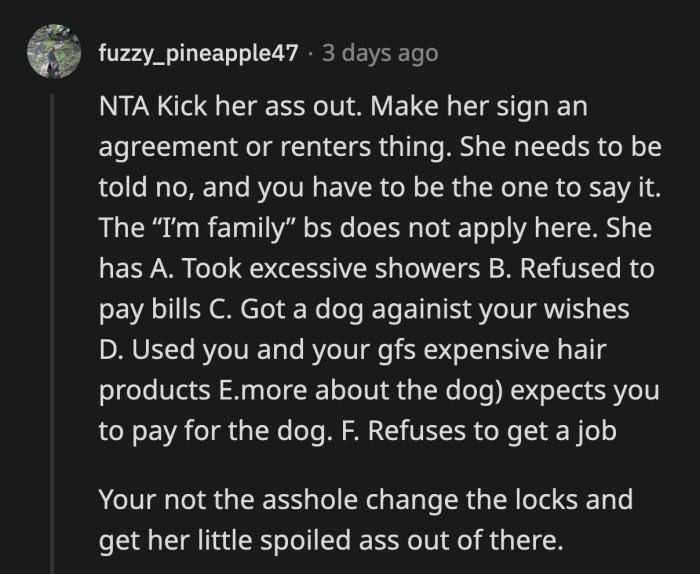
His emotional attachment to his sister is clouding his judgment.
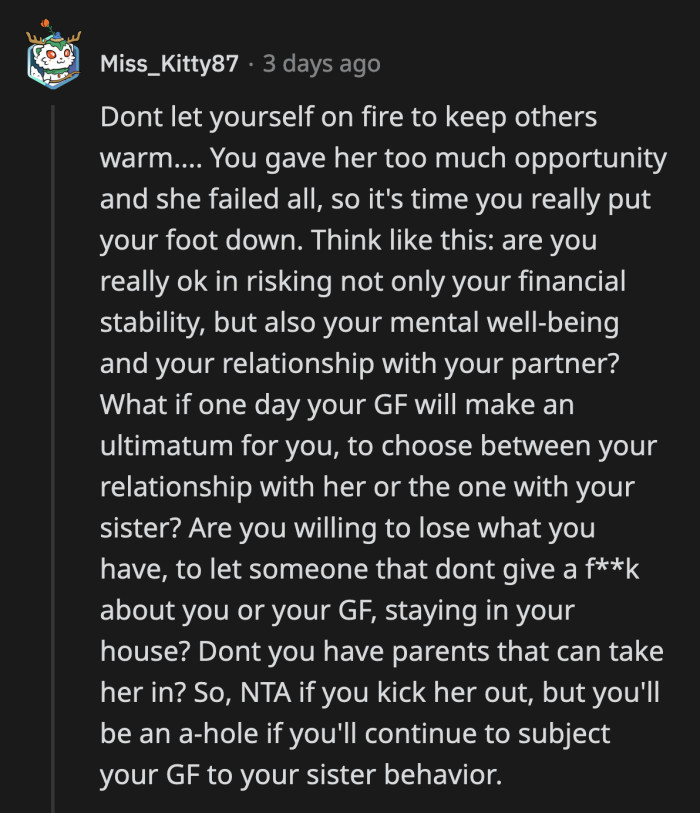
OP needs to familiarize himself with his local laws and evict his sister properly if necessary.
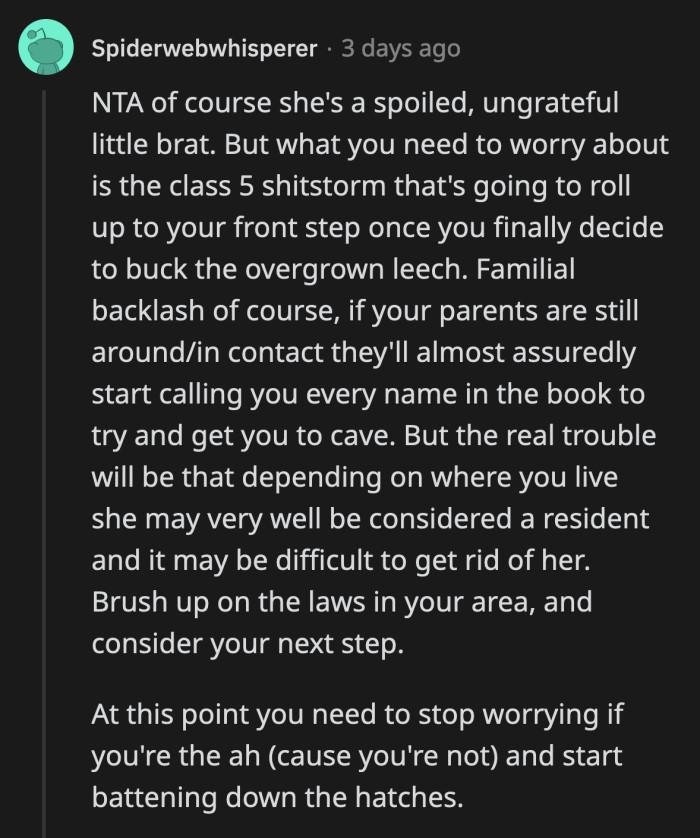
If not, he will be saddled with her and whatever other expenses she brings into his house.
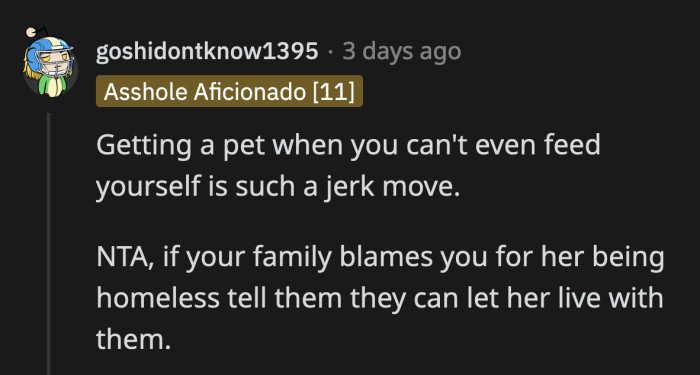
Helping someone in need is never a bad thing. However, there is a difference between kindness and allowing people to walk all over you.
OP has given his sister enough time to get back on her feet. Kicking her out because she took advantage of him will not make him a bad person.
Psychological Analysis
This scenario highlights the often complicated nature of sibling relationships, particularly regarding financial and emotional support. When one sibling feels burdened by another's choices, it can lead to significant frustration and resentment. Recognizing these dynamics is essential for fostering healthier interactions and mutual understanding between siblings.
Analysis generated by AI
Analysis & Alternative Approaches
In conclusion, navigating sibling dynamics, particularly regarding responsibility and support, is a complex issue that requires careful consideration. By fostering open communication and setting healthy boundaries, siblings can maintain their relationships while encouraging personal growth. Ultimately, understanding the psychological aspects at play can lead to more balanced family interactions and improved well-being for all parties involved.



